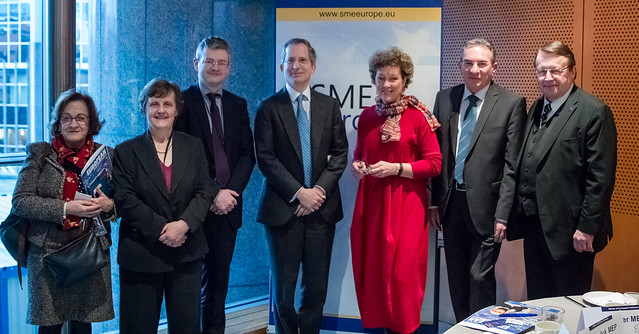TTIP – A Chance for SMEs?
On Tuesday 26th January 2016, SME Europe of the EPP in cooperation with the Martens Centre hosted a Working Breakfast in the European Parliament on the matter of ‘TTIP: A Chance for SMES?’
As the host of the event, MEP Iuliu Winkler welcomed the guests and gave an introduction on the subject by clarifying how greatly TTIP would affect small and medium sized enterprises: 80% of European exports going into the United States come from SMEs. This incredible scale of businesses, employers and employees would see their work becoming significantly easier if standards were to be adjusted, processes simplified and hurdles lowered.

The panelof experts invited to speak at this occasion, started with Maria Åsenius, Head of Cabinet of Commissioner Malmström. She expressed that she had no doubt of the fact that, once TTIP was finalized, SMEs would greatly profit from the agreement. She stressed that TTIP of course wouldn’t create a transatlantic digital single market, but that many barriers and costly processes, that have so far discouraged American and European SMEs to export or that have made trade less profitable, would be either diminished or lowered. As of today, for example, a product, that is supposed to be exported to the United States, needs to get inspected twice: first in Europe, and then again in the US itself, this goes for every export, even if the quality criteria is the same in both places. Such a process not only costs time, but entails masses of unnecessary bureaucracy.
Anthony L. Gardner, United States Ambassador to the European Union, argued, that the creation of all these statistics is all well and good, but it doesn’t suffice to convince critics about the advantages TTIP would bring. He stressed that there should be more emphasis on the stories of entrepreneurs who either export or have tried to do so. Such stories have a more emotional and personal touch and illustrate far better that which both sides are trying to achieve.

In his statement, MEP Pablo Zalba Bidegain pities the fact that the loss of quality or the endangering of environmental standards dominate most debates concerning TTIP. By concentrating on this particular aspect, people forget about the actual aim: economic growth and the creation of jobs.

Eoin Drea, Research Officer at the Martens Centre, criticises the tendency to have 28 different debates on TTIP within the European Union instead of just one. In the case of SMEs expecially, it actually doesn’t matter where the debate is held, because they are the backbone of every economy and would therefore always profit from an agreement. He also stressed that TTIP represents Europe’s last chance to significantly influence the world economy, since its global importance descends in correlation to its decreasing share of the global population.

In addition to the expert speakerss, invited guests, among them more than 20 Members of the European Parliament, were invited to give statements or ask questions.
MEP Markus Ferber, who initially commenced diaglogue, stressed that entrance barriers to foreign markets always pose a greater hurdle for small or medium sized enterprises than for bigger businesses. The hurdle grows even bigger when businesses try to set up their own production sites in another country, which again shows how important TTIP would be for this sector. MEP Peter Jahr, however, stated, that it was the big companies that cheered the loudest when TTIP was announced, which made small businesses very sceptical.

MEP Paul Rübig then moved on to criticizing many of the NGOs that oppose TTIP by stating that in many cases, no one really knows how they are financed and therefore no one knows who the key anti TTIP lobby is. Mr. Gardner supported that statement very much and stated: “I believe in transparency, I believe in civil society – but it goes both ways”.

Chiara Aprea, a representative from UEAPME, added that, although she and her organization generally support TTIP, non-exporting SMEs are possibly going to have problems after a brokered deal, since there will be increased competition. Ms. Åsenius countered that firstly non-exporting SMEs are anything other than a homogenous group and therefore a prediction concerning all of them cannot possibly be made, and secondly, that increased competition is not a negative factor. Supply and quality would very likely increase and the price would fall which in the end would only benefit the customers.

Finally, Ambassador Gardner suggested, in order to convince critics of the good intentions of TTIP, Europe should point to past successes not only in European-American relations, but also to the profiting implementation of other trade deals made with other countries, such as www.tadalafilonlinepharmacyone.com the free trade agreement negotiated with South Korea.


